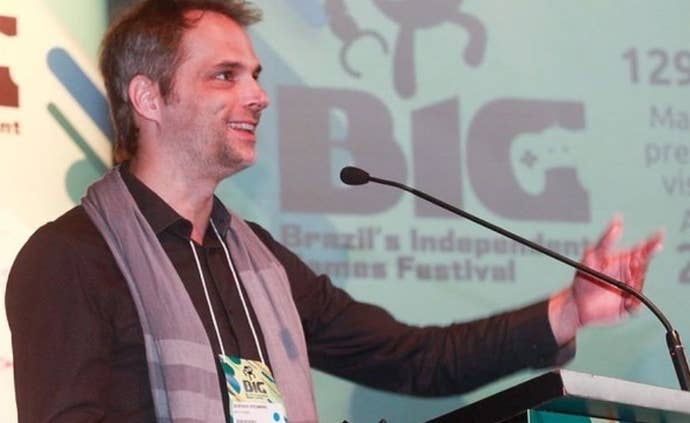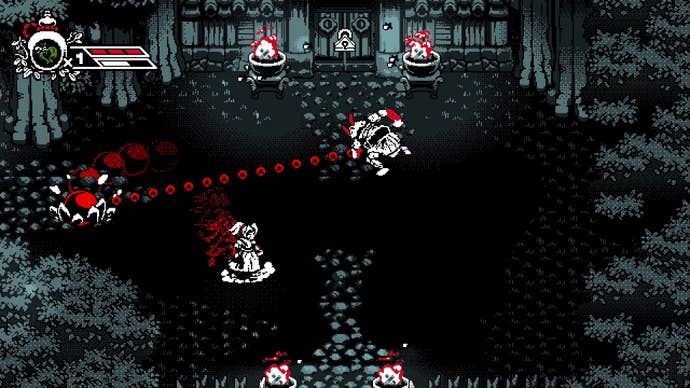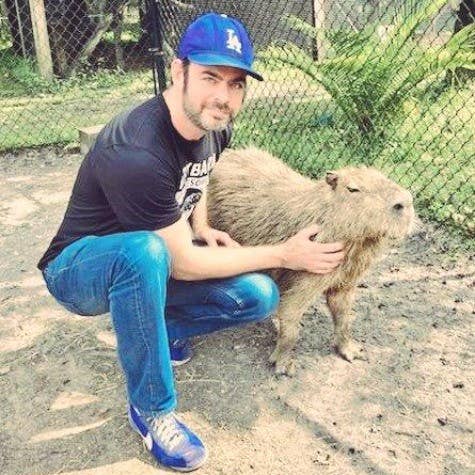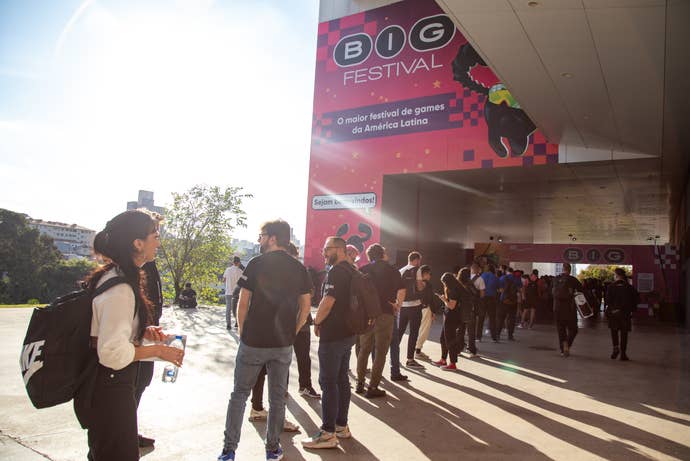Products You May Like
You know the worst thing about E3, towards the end? It felt so false. It was the event equivalent of that Steve Buscemi ‘how do you do, fellow kids?’ meme – corporations rocking up and asking you to ‘hang out’, watch some ‘rad gameplay trailers’, and engage with its ‘poggers’ branding. Opening up to the public, the show didn’t really know what it wanted to be: was it a mega-serious B2B corporate fair that excelled at meetings and behind-closed-doors secret handshakes? Or was it a hip, young, and cool game fest that understood what it was to be a Gen Z gamer willing to spend megabucks to get to downtown LA for a few days and soak up the vibes?
In 2023, E3 was supplanted – at least somewhat – by Summer Game Fest. One big show, leading a flotilla of smaller publisher-run events, it’s like the failed clone of E3: less impactful, less impressive, less prestigious. It’s getting there, sure, but after talking to a lot of smaller publishers, Summer Game Fest is seen as something of a walled garden; a place where only the ‘select few’ can get in if they know the right people (or have a big enough checkbook on hand).
I was at Summer Game Fest a few weeks ago, and a lot of people there – journalists, publishers, developers, creators – all felt the specter of E3 hanging around, an unexorcised phantom. Its influence can still be felt, and with good cause; it was Gamer Christmas, and had been for years. Whatever happens with it in the future, E3 has a long tail, and it will continue to exert its pressure in some form, alive or dead, for years to come.
So what a difference it is to come to Brazil’s BIG festival. Set in a convention center in Sao Paulo, this massive event – the biggest games festival in Latin America since 2012 – has what I feel has been missing from these other game events for a while. Walking around the show floor, there’s a sense of proper excitement and enthusiasm, an understanding of what makes games great and fun and social. It’s similar to Gamescom, but with that undeniable Latin American flavour.

“I don’t want to sound rude, because E3 was an amazing event, but [it going away] does give us more spotlight because we are conveniently located as the biggest event, at the same time in the calendar,” says the genial and polite Gustavo Steinberg, the creator and executive director of BIG Festival. “That was actually my sales pitch for some of the publishers, actually. I said, ‘when are you going to release your trailer? At E3, no? So do it here! [laughter]”.
It’s possible BIG’s authenticity comes from the make-up of the event: on the show floor, the vast majority of exhibitors are indie developers. There’s a whole row of indie games from Brazil, shown off proudly in the middle of the exhibition hall. Eager gamers – from kids to geriatrics! – line up to demo small, appealing titles you’ve probably never even heard of.
Meanwhile, Warner Bros., Microsoft, Ubisoft, and Konami… they’re all off to the side, limited to small stands, given space to promote themselves quietly. Here, the smaller creators get the louder voice, and that’s amazing. I’ll have a separate piece on the site soon about the best smaller games I played here, but this focus and passion for the more grass-roots part of the development scene is refreshing.
“We call that space the ‘world panorama’ – where we invite publishers to bring recent releases to the crowd. Sometimes, publishers want more space (there’s Nintendo, Epic, and Warner Bros. outside of that space now) and they’re welcome to it,” explains Steinberg. “But the focus is really on the indie. And there is freshness in the air because it’s a market that’s not really that developed yet, here in Brazil. It’s not established – so you can see the passion in the developer’s eyes when they’re saying ‘I wanna make it, I wanna make it’. It reminds me of my first few years of making movies here; the developers are that passionate. That’s why they’re the center of attention.”
Steinberg notes that Brazil has jumped from being home to roughly 20 games studios back when he first started to more than 1000 now. Safe to say, Brazil is a game development hub to really look out for.
That’s not to say there isn’t a place for headline-catching announcements though. At the 2023 show, Atari came out swinging and showed off three titles; Mr. Run and Jump (think somewhere between Super Meat Boy and VVVVVV and you’ll have an idea of what this is), Haunted House (a modern reboot of the 1982’s survival-horror experiment, modernized and modified by Brazilian developer Orbit Studios), and Quantum: Recharged (the ninth modern arcade retread that looks to be as authentic as Yars’ Revenge and Breakout). That’s a pretty big deal (no pun intended) for a publisher that’s been dormant for a few years. It demonstrates Atari cares about Latam talent, and the Latam audience, in equal measure.
Konami – in a similar, but not quite as extreme, state as Atari – also used BIG to continue its rehabilitation in the public eye. During the festivities at Sao Paulo, Konami was eager to showcase its third-party publishing push. This mostly came in the form of the publisher proudly showing off the fascinating ‘cinematic shmup’ CYGNI: All Guns Blazing, but also manifested in Michael Rajna (senior director of business development and licensing for Konami) giving an insightful lecture on how indies can appeal to the Japanese-American company and be a part of its so-far-so-positive third-party initiative.
“I don’t know how big we’re going to get, but we’ll get as big as necessary,” explains Steinberg when I ask him how much space there is to grow the festival. “We don’t want to push it too far, because we are not Europe, right? But to an international audience, we have something to show – which some people find surprising. And I think it’s because we have this mix of B2B and consumer show, all on the floor together. It’s something different.”

Sure, Konami indies and Atari announcements aren’t Geoff Keighley levels of big (yet), but the show is attracting the right kind of attention. As it should; BIG has been going 11 years, and with the demise of E3 and the stage opening up to other events, Brazil’s premier gaming festival has what it takes to really steal the spotlight in the years to come.
Perhaps the future of game events isn’t in one big place, as an E3 or something similar. Perhaps it’s in these slightly smaller-scale shows like BIG or Gamescom (who have partnered up, and run an exchange programme of sorts, by the way). These events, without the behemoth overheads of the Los Angeles Convention Centre, for example, are more affordable. It’s less than a tenner to get into BIG, and similarly cheap for Gamescom. And because BIG attracts talent and attention from Argentina, Columbia, Uruguay, Chile – and many more South American countries – the result feels more jubilant, more celebratory, than other similar events I’ve been to.

Per Chance Glasco, one of the founding members of Infinity Ward, creator of Call of Duty, and head of indie outfit Good Dog Studios, launching a game here feels quite unlike launching a game anywhere else. “Where’s a better place to launch a game about martial arts in Brazil than… Brazil?” he jokes. “Culturally, Brazilians are super friendly, and they have been very, very appreciative that [I’m showing their country] in a positive way. There’s an extremely excited energy here that you just aren’t going to get [in other markets].”
Sitting down to write this, listening to some Sao Paulo locals giggle and cheer as they complete the demo for Bloodless – a stylish, retro, action-adventure that won Best Brazilian Game at BIG – it’s hard not to be impressed with what’s going on here. The vibe here is a far cry from the throbbing dubstep and endless repeating game demos of E3, and a more celebratory, open experience than the sealed-off campus at Summer Games Fest.
Disclaimer: VG247 was offered a free ticket to BIG festival, and travel and accomodation were provided by the organisers for the duration of the event.
